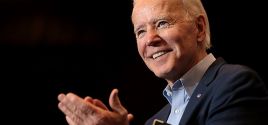The Unintended Humor in Wikileaks Criticismby Kevin CarsonDec. 01, 2010 |
Popular 
'This is Cruelty, This is Not War': Pope Francis Condemns Gaza Genocide in Christmas Message

Putin Accuses 'Ethnic Jews' of Tearing Russian Orthodox Church Apart

Elon Musk Says Americans Are Too 'Retarded' for Tech Jobs, Censors Critics

Biden Commutes Sentences of 37 of 40 Federal Death Row Inmates - Excludes Robert Bowers, Dylann Roof

Ohio Senate Passes Bill Aimed at Outlawing Criticism of Israel, Criminalizing Gospel
 Sheldon Richman, in the Christian Science Monitor (“Bradley Manning isn’t a Criminal; He’s a Hero,” Nov. 29), raised the issue of the American public’s right to know about government operations overseas for which they “could suffer retaliation.” Excellent point. Glenn Greenwald noted (Salon, Nov. 29) that the same people who casually dismiss innocent casualties like Afghan wedding parties as “unfortunate and unavoidable collateral damage” are also the first to say Manning and Assange have “blood on their hands” (you know, like what they so presciently warned would result from previous leaks), and call for treating them as terrorists if even one person dies as an indirect result of their leaks. I suppose for such people the number of Americans who get killed as a result of blowback from peace-loving American foreign policy is also unavoidable collateral damage. But oddly enough, they’re not as tolerant when it comes to the lives allegedly endangered as collateral damage from letting the American people know what “their” government is doing. And oddly enough, Congressman Peter King isn’t demanding the U.S. government be classified as a terrorist organization when it launches a war that will (to borrow a phrase) “put countless innocent lives at risk.” Apparently the goals and interests of the allegedly sovereign people aren’t worth as much collateral damage as those of their “public servants.” Former Clinton Administration official Jamie Rubin, a certified Serious, Responsible Thinker, has been hitting the talking head circuit arguing that Wikileaks has no principled standard for determining what should be leaked. The stuff in the latest release, he says, isn’t like the Pentagon Papers — involving the wisdom of the highest levels of policy — but rather interferes with the government’s ability to maintain the secrecy needed for carrying out the operational details of any policy. The cable leaks impede the government’s ability to “promote the security interests of the American people.” I think, rather, that Rubin lacks any coherent standard for distinguishing the “important” stuff from the “operational” stuff. I’d say the fact that the U.S. government is using the government of Yemen as an imperial proxy, to provide political cover for conducting drone strikes that are wildly unpopular with the people of a region in which the U.S. is supposedly trying to promote “democracy,” goes to the fundamental character of policy. Not only the American people but the people of states like Saudi Arabia have a right to know when “their” governments are egging each other on to launch an attack on Iran that could result in regional chaos and $500/barrel oil. Here’s my nomination for this year’s Orwell Award, from White House Press Secretary Robert Gibbs: “…[S]uch disclosures put at risk… people around the world who come to the United States for assistance in promoting democracy and open government. These documents also may include named individuals who… live and work under oppressive regimes and who are trying to create more open and free societies.” So by informing the people of oppressive regimes like Saudi Arabia and Yemen about the dirty things their governments do in collusion with the U.S., Wilileaks is undermining efforts by the U.S. government to — ahem! — promote democracy, open government, and open and free societies in Saudi Arabia and Yemen. Rubin’s real mistake, as a certified Serious Thinker (what sociologist C. Wright Mills called a “crackpot realist”) is believing the U.S. government is mostly a force for good, and is pursuing something that can legitimately be called the “security interests of the American people.” The truth is, governments are evil. A government’s foreign policy serves the primary purpose of promoting, not some disinterested “security interests of the people,” but a domestic system of power. American foreign policy serves the coalition of corporate interests that controls the state. Saudi foreign policy serves the interests of the House of Saud, the oil industry and other economic interests attached to it. Yemeni foreign policy is governed by similar considerations of class. And the relations between these governments are the relations between so many crime families that have divided up the world. In arguing that Wikileaks should not impede the ability of the government to “promote the interests of the American people,” what Rubin really means is that the American government should be free to promote the interests of the corporate ruling class, and to act in collusion with similarly criminal governments around the world in promoting their joint interests at the expense of the ruled, without any interference from the “sovereign” peoples which they allegedly represent. The sovereign peoples, at best, can participate in a spectator election every few years to choose between members of competing wings of the same establishment with almost identical agendas, and then sit down and shut up and supply blood and treasure to the Serious Thinkers who rule by the grace of God. C4SS Research Associate Kevin Carson is a contemporary mutualist author and individualist anarchist whose written work includes Studies in Mutualist Political Economy, Organization Theory: An Individualist Anarchist Perspective, and The Homebrew Industrial Revolution: A Low-Overhead Manifesto, all of which are freely available online. Carson has also written for such print publications as The Freeman: Ideas on Liberty and a variety of internet-based journals and blogs, including Just Things, The Art of the Possible, the P2P Foundation and his own Mutualist Blog. |



